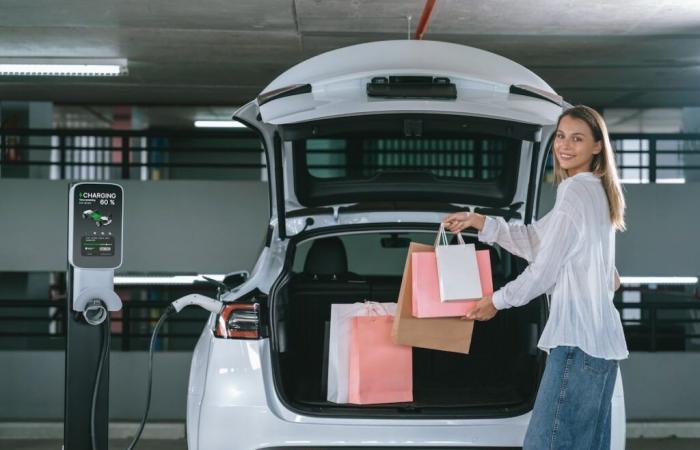It’s the turn of Auchan, Decathlon and Leroy Merlin to support the energy transition. The three brands of the Mulliez group plan to deploy thousands of charging stations for electric cars in their parking lots.
5,000 charging stations by 2028
By 2028, 5,000 charging stations for electric vehicles (EV) will be installed in 350 car parks of three brands of the Mulliez group: Auchan, Decathlon and Leroy Merlin. These terminals, resulting from a partnership with Voltalia, will be accessible under the group’s own brand: The Full.
This massive deployment aims to respond to the future automobile market, in particular due to the ban on thermal cars enacted by the European Commission by 2035. Currently, only 2 million EVs (and plug-in hybrids) are in circulation, but, according to projections from the Ministry of Ecological Transition, this figure should reach 7 million by 2030. Three charging levels will be offered, announces the group:
- Slow charging (11 kW) : 0.26 €/kWh.
- Fast charging (22 to 50 kW): €0.39/kWh.
- Ultra-fast charging (up to 100 kW): €0.49/kWh.
These advantageous rates will be reserved for RFID card holders The Full and users of its application. Unregistered users will have to pay a higher rate, increased by 10%. This model aims to encourage consumers to be loyal to one of these three brands.
A response to legal obligations and competition
In addition to the commercial aspect, this project meets regulatory requirements. The mobility orientation law (LOM) now requires car parks open to the public with more than 20 spaces to provide charging stations.
A legal framework which has already pushed several French major retail brands to install terminals in their car parks, notably Carrefour with its Driveco terminals, or even Leclerc via its service La Borne. In fact, with the LOM law, almost half, or 4 out of 10 public terminals, are located in a supermarket parking lot.
Gradual deployment and discounts for the most loyal
Deployment will begin this year 2025with the installation of pilot terminals on around ten sites. Ultimately, the objective is to cover a large territorial network, allowing customers to easily access these infrastructures, whether they are in urban or rural areas, and therefore to be able to recharge their vehicle while they go shopping.
Another advantage: thanks to the loyalty card, owners will be able to benefit from reduction, thanks to loyalty points which will be granted to them each time they recharge. Decathlon for its part even foresees a 10% reduction in the price of its recharge for its loyal customers.
A reaction? Leave a comment
Did you like this article? Subscribe to our free newsletter for engaging articles, exclusive content and the latest news.






